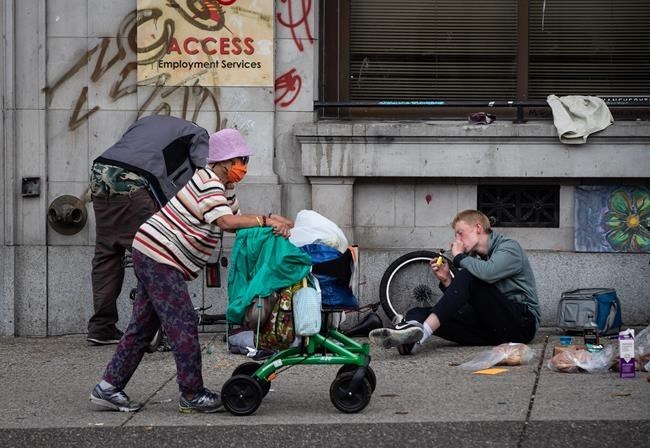
A woman walks past a person using a glass pipe to smoke drugs in the Downtown Eastside of Vancouver, on International Overdose Awareness Day on Tuesday, August 31, 2021. THE CANADIAN PRESS/Darryl Dyck
Republished December 09, 2021 - 12:50 PM
Original Publication Date December 09, 2021 - 9:21 AM
VICTORIA - British Columbia is losing more than six people a day to overdoses due to toxic drugs, which the chief coroner says is the leading cause of unnatural deaths in the province.
Lisa Lapointe said there were 201 overdose fatalities in October, bringing the total for the first 10 months of the year to 1,782 deaths, the highest ever in a calendar year in B.C.
"This crisis has gotten worse and worse and worse. The toxic drug supply has become more toxic,” she said.
“And people are dying at an unprecedented rate every day in every community. So, I think it's a collective failure."
Almost 80 per cent of those who died in October were male, and about 71 per cent of the fatalities were people between 30 and 59 years of age.
More than 8,500 people have died from drug overdoses since 2016, the same year the province declared a public health emergency.
"These are terribly difficult days," said the visibly emotional Lapointe.
"And it is so disheartening to see so many lives cut short, despite the many heartfelt efforts being made to help. Simply put, however, we are failing."
Drug toxicity is the leading cause of all unnatural deaths, surpassing vehicle crashes, homicide and suicide combined, Lapointe said.
While the powerful opioid fentanyl has been linked to 84 per cent of the overdose deaths this year, Lapointe said benzodiazepines are a factor in the increased numbers of those fatalities.
Opioids respond to the overdose-reversing drug naloxone, but other drugs do not, she said. Most people get these drugs on the black market, where supplies are unregulated, she added.
"So, very few people are dying with one substance alone in their system," Lapointe said. “It's a toxic cocktail of several substances. Whether they intended to take two or three of those substances, we don't know.”
Since the province declared a health emergency in April 2016, it has taken several steps to try to stem the crisis, including opening supervised consumption sites, providing a safe supply program that allows doctors or nurse practitioners to prescribe pharmaceutical alternatives and providing more addiction treatment spaces.
"I think potentially at the beginning, there was some thought that if we did a few things, a few relatively minor things, this would take care of itself. That has not happened," Lapointe said.
The largest numbers of deaths have been recorded in urban centres such as Vancouver, Surrey and Victoria, the coroners service said, but death rates are at record levels in every health authority.
Lapointe said one of the challenges to fighting the overdose crisis is lack of concrete data, including how many people are using drugs and what kind.
"We hear the number that is commonly used is 90,000 people in our province are dependent on opioids," she said.
Sheila Malcolmson, minister for mental health and addictions, said the historic overdose death numbers are tragic and painful.
"As minister of mental health and addictions, I feel British Columbians' grief and I feel their frustration," she said at a news conference. "Almost every person in this province knows someone whose life was cut short by illicit drug toxicity. I am so sorry for every loss."
B.C. is working to implement groundbreaking treatment programs to stop the number of deaths, she said.
"We are fighting on multiple fronts to save lives and connect more people to the services that they need and deserve," said Malcolmson.
She said B.C. has doubled overdose prevention and consumption sites, it is the first province in Canada to prescribe a safe supply and has applied to the federal government for an exemption to decriminalize possession of small amounts of illicit drugs.
The province is also opening hundreds of treatment and recovery beds across the province, she said.
"We all feel the urgency of this crisis," Malcolmson said. "We don't accept the loss of life, not for a minute."
— By Hina Alam in Vancouver and Dirk Meissner in Victoria
This report by The Canadian Press was first published Dec. 9, 2021.
News from © The Canadian Press, 2021